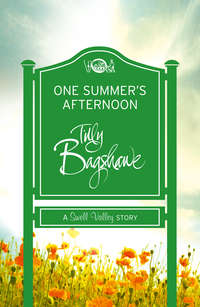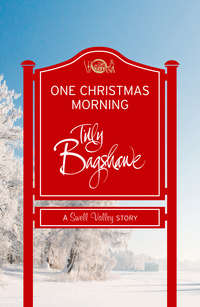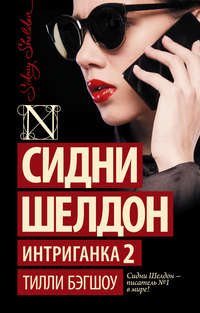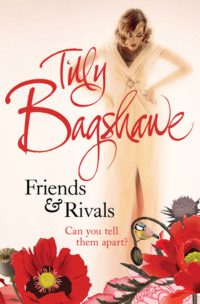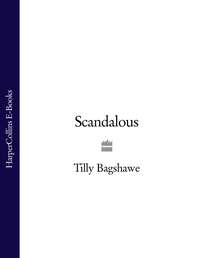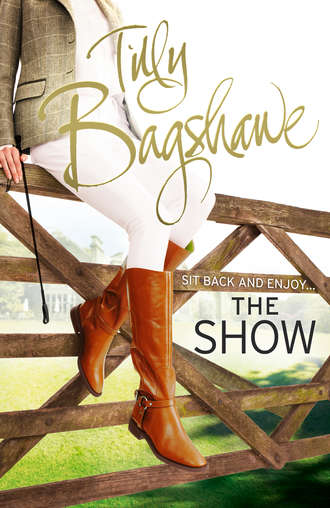
Полная версия
The Show: Racy, pacy and very funny!



Copyright
Published by HarperCollinsPublishers Ltd
The News Building
1 London Bridge Street
London SE1 9GF
www.harpercollins.co.uk
First published in Great Britain by HarperCollins Publishers 2015
Copyright © Tilly Bagshawe 2015
Cover layout design © HarperCollinsPublishers Ltd 2015
Tilly Bagshawe asserts the moral right to be identified as the author of this work.
A catalogue copy of this book is available from the British Library.
This novel is entirely a work of fiction. The names, characters and incidents portrayed in it are the work of the author’s imagination. Any resemblance to actual persons, living or dead, events or localities is entirely coincidental.
All rights reserved under International and Pan-American Copyright Conventions. By payment of the required fees, you have been granted the non-exclusive, non-transferable right to access and read the text of this e-book on screen. No part of this text may be reproduced, transmitted, down-loaded, decompiled, reverse engineered, or stored in or introduced into any information storage and retrieval system, in any form or by any means, whether electronic or mechanical, now known or hereinafter invented, without the express written permission of HarperCollins.
Source ISBN: 9780007523023
Ebook Edition © 2015 ISBN: 9780007481415
Version: 2015-05-19
Dedication
For Zanna. With love.
Table of Contents
Cover
Title Page
Copyright
Dedication
Map
Cast of Characters
Part One
Chapter One
Chapter Two
Chapter Three
Chapter Four
Chapter Five
Chapter Six
Chapter Seven
Chapter Eight
Chapter Nine
Chapter Ten
Chapter Eleven
Chapter Twelve
Chapter Thirteen
Chapter Fourteen
Chapter Fifteen
Part Two
Chapter Sixteen
Chapter Seventeen
Chapter Eighteen
Chapter Nineteen
Chapter Twenty
Chapter Twenty-One
Chapter Twenty-Two
Chapter Twenty-Three
Chapter Twenty-Four
Chapter Twenty-Five
Chapter Twenty-Six
Chapter Twenty-Seven
Chapter Twenty-Eight
Chapter Twenty-Nine
Keep Reading: The Inheritance
Keep Reading: The Swell Valley Short Stories
Acknowledgements
About the Author
Also by Tilly Bagshawe
About the Publisher
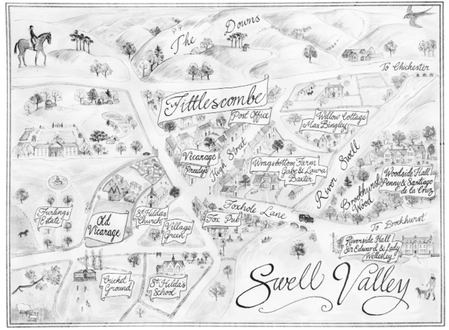
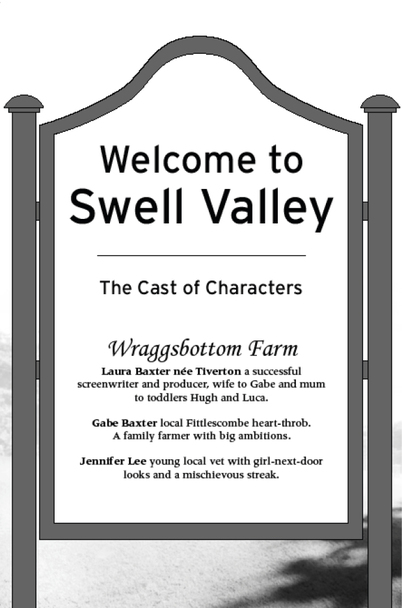
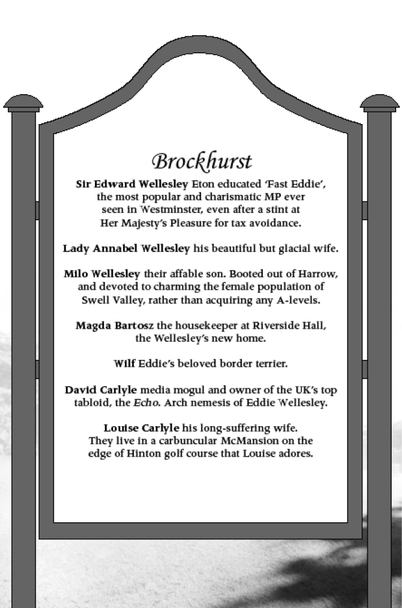
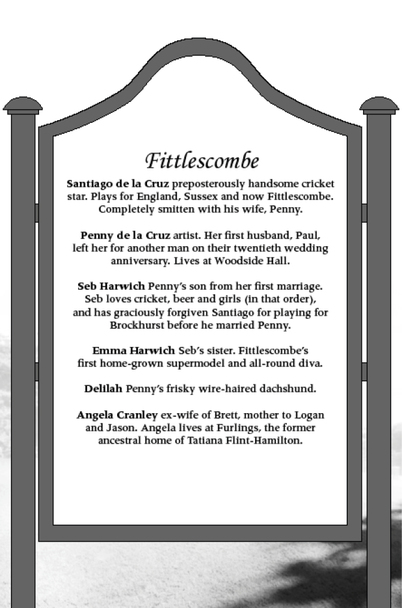
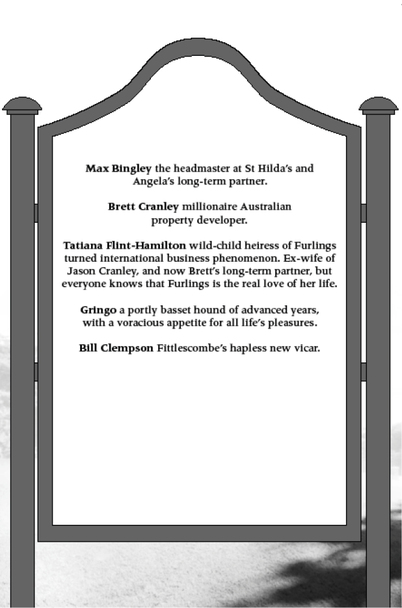
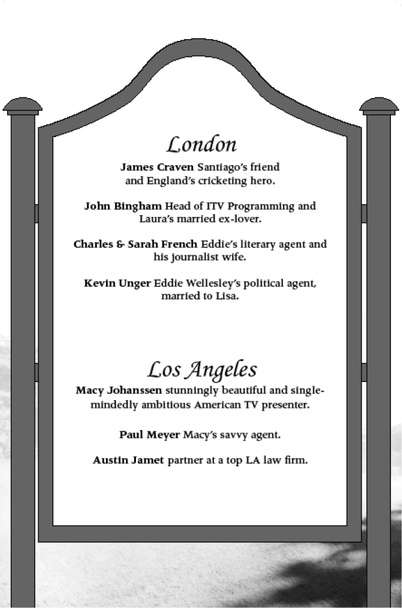
CHAPTER ONE
Gabe Baxter leaned over and whispered in his wife’s ear.
‘This is awful.’
‘Shhhh,’ Laura Baxter giggled.
‘I can’t shhh. I can’t stand it,’ said Gabe, running a hand through his thick blond hair. ‘Do you think if I offered to pay for the whole roof, she’d stop singing?’
‘Be quiet,’ Laura hissed at him. ‘You can’t even pay for your beer, never mind the school roof. So you’re just going to have to let it go!’
Gabe groaned. The Baxters were in the snug bar at The Fox on Fittlescombe Green, along with the rest of the village on this wet January evening, watching the talent show. Danny Jenner, The Fox’s landlord and village gossip, had organized the event to raise funds for a new school roof. The current performer, Claire Leaman, a dumpy twelve-year-old girl with boss eyes and a wildly misplaced confidence in her own abilities, had spent the last three minutes belting out the Frozen theme tune as if she were on stage at the Oscars, tossing her hair about and warbling like an opera singer on helium. After ‘Mike Malloy’s Marvellous Magic’ (a single, lame handkerchief trick) and Juggling Jack Willoughby, the half-blind church warden from Brockhurst, Gabe had dared to hope that they’d seen the worst of the night’s performers. Apparently he was wrong.
‘HERE I stand! And HERE I’ll staaaaa-aaaay!’ Claire screeched.
‘She can bloody well stay on her own,’ Gabe whispered back to Laura. ‘I’m going out for a smoke.’
‘Gabe. You can’t.’
‘Why not?’
‘Because she’s Gavin Leaman’s daughter, for one thing.’
‘All the more reason to get out of here,’ Gabe said with feeling.
Gavin Leaman was one of a group of ramblers – ‘The Swell Valley Right-to-Roamers’ they called themselves – who had had the audacity to tramp through Gabe’s orchard last weekend, and who had even wandered into his garden. Gabe had been enjoying Match of the Day in his living room when, as he put it, ‘some sanctimonious cagouled muppet with an Ordnance Survey map’ waved at him cheerfully, as if Gabe and Laura’s land was some sort of public park. Gabe had marched outside to have words with the intruders, and had ended up getting into an unfortunate row with Fittlescombe’s new vicar, Bill Clempson. It turned out the vicar was leading the charge on behalf of the ramblers, armed with a sensible padded nylon bum bag and a whistle.
‘You put them up to this, didn’t you, Vicar?’ Gabe said accusingly.
Bill Clempson pursed his lips. ‘I didn’t put anyone up to anything. These people have a perfect right to ramble here.’
‘First of all, they’re not “rambling”,’ Gabe said with feeling. ‘They’re not fucking Wombles. They’re trespassing.’
‘There’s no need to resort to bad language,’ chided the vicar.
‘If you’d taken the time to read the Countryside and Rights of Way Act 2000,’ one of the walkers piped up, an overweight woman in much-too-tight breeches, whom Gabe recognized from his son’s nursery, ‘you would know that the British countryside belongs to all of us.’
Gabe stepped forward menacingly. ‘Not this bit, sweetheart. You have precisely sixty seconds to get off my land or I’ll set the dogs on you. You too, Bill.’ Gabe growled at the vicar. Fucking interloper. Who did Clempson think he was?
This being Fittlescombe, exaggerated versions of this showdown were soon flying around the village, with Gabe Baxter either painted as the heroic defender of property rights (an Englishman’s home is his castle, after all) or an elitist snob who begrudged ordinary villagers, and even the parish vicar, a harmless stroll through his fields.
Laura had tried to keep out of it as much as possible. Gabe was right, in her view, but as usual he’d lost his temper and been horribly rude to people that they ran into in the village every single day, which didn’t help their cause, or make Laura’s life any easier. Still, these sorts of spats were part of village life. Not the first time, Laura felt as if her life was morphing into one long episode of The Archers.
Claire Leaman, the rambler’s daughter, was still caterwauling.
‘Sorry,’ said Gabe. ‘That’s it.’ With a mortifying clattering of bar stools, Fittlescombe’s best-looking farmer made his way noisily to the door, earning himself a furious look from Claire’s father and envious ones from just about everybody else.
‘I’m so sorry,’ Laura whispered to her neighbours as she followed him, blushing furiously. ‘He’s got a migraine.’
‘Haven’t we all?’ grumbled the old man near the door.
Outside, Laura found Gabe huddled beneath a willow tree, trying unsuccessfully to light a damp roll-up.
‘That was rude,’ she chastised him. ‘Poor girl.’
‘Poor girl?’ Gabe’s eyes widened. ‘What about the rest of us? Good grief. She’s got no more business singing in public than I have stripping naked and streaking through the House of Lords. Or going for a Sunday walk in somebody else’s garden. It’s just … wrong.’
He pulled an indignant face that made Laura burst out laughing.
‘You’re just wrong! Selfish arse.’
‘I’m so wrong, I’m right.’ Gabe grinned, lifting up an arm so that Laura could slip beneath it. ‘Right?’
Even after nearly ten years of marriage, Laura Baxter found it almost impossible to be close to her husband without touching him. Leaning into his broad chest, she breathed in his familiar, musky smell. Gabe was so handsome, it was almost offensive – blond and brawny and with the sort of smile that could light up even a dreary, drizzly January night like this one. Laura had moved to the Swell Valley to be with him, despite a very rocky courtship, and they were now the parents of two small boys. The Baxters were often broke and always exhausted, but Laura wouldn’t have traded their life for anything.
‘Traitors.’
Santiago de la Cruz – cricket star, valley local and Gabe’s close friend – slipped out a few moments later, nursing a glass of Laphroaig. Santiago was also gorgeous, although in a very different way from Gabe. Tall, dark and quintessentially Latin, he was always perfectly groomed, a thoroughbred racehorse to Gabe’s mud-splattered mustang.
‘How could you leave me in there?’ He rubbed the side of his head ruefully. ‘I think my ears have started to melt.’
He was followed by his wife, Penny. Widely agreed to be both the kindest woman in Fittlescombe and the worst dressed, Penny de la Cruz was almost invisible tonight beneath about six layers of sweaters, her wild, Pre-Raphaelite hair spilling out at the top like a fountain. Penny, bravely, had been on the side of the ramblers in the great ‘right-to-roam’ debacle. Santiago felt strongly that they should all be shot.
‘Honestly.’ Penny looked at Gabe, Laura and Santiago disapprovingly. ‘The three of you look like naughty schoolchildren, smoking behind the bike sheds. Come back inside before you catch hypothermia.’
‘Has she stopped?’ Gabe asked.
‘She’s stopped.’
‘Do you promise?’
‘Yes,’ said Penny. ‘And … I have gossip.’
That was all it took. Two minutes later the four of them were seated round a corner table, ignoring the next act while Penny spilled the beans.
‘Riverside Hall at Brockhurst has finally sold,’ she whispered importantly.
‘That’s it?’ said Santiago. ‘That’s the gossip?’
‘Nooooo.’ Penny shushed him. ‘The gossip is the new owners.’
She smiled cryptically.
‘Well, go on then,’ said Laura. ‘Who is it?’
‘Guess.’
‘We can’t guess. How are we supposed to guess?’
‘Simon Cowell,’ said Gabe.
Santiago gave him a look. ‘Simon Cowell? Why would Simon Cowell move to Brockhurst?’
Gabe shrugged. ‘Why not? You did. All right then. Madonna.’
‘Now you’re just being ridiculous.’
‘What? She loves the English countryside,’ said Gabe. ‘She wears flat caps and drinks pints, remember?’
‘That was in her Guy Ritchie stage. Now she dates Brazilian teenagers and photographs her armpit hair,’ Laura reminded him. ‘Do keep up, darling.’
Never let it be said that she was behind on her celebrity gossip.
‘I’ll put you out of your misery,’ said Penny. ‘It’s Sir Edward Wellesley.’
There was a stunned silence. Gabe broke it first.
‘Isn’t he in prison?’
‘He gets out next week.’
‘Blimey. That wasn’t long. I might avoid my own taxes next year if that’s all you get.’
‘You have to have income to pay taxes,’ Laura reminded him sweetly.
‘Good point.’ Gabe squeezed his wife’s thigh.
‘Are you sure about this?’ Santiago asked Penny. For some reason he found it hard to imagine England’s most notoriously flamboyant, disgraced politician settling down to the quiet life in the Swell Valley. Especially in Riverside Hall, a grand but isolated old building that had stood empty for well over a year.
‘Positive. Angela Cranley saw Lady Wellesley with the estate agent last week. They completed ten days ago, apparently.’
‘Isn’t she supposed to be a nightmare?’ Gabe asked. ‘The wife?’
‘God yes. She’s a horror, a terrible snob. Do you remember how “Let them eat cake” she was at his trial?’ said Santiago.
‘I’m sure she was under immense pressure,’ Penny said kindly. ‘We must all give them a chance.’
Laura sipped her gin and tonic and felt a rush of pure happiness. She loved Penny and Santiago. She loved this pub, and village life, and the tight, gossipy world of the valley, a world where a new arrival with a scandalous past was ‘big news’. But most of all she loved Gabe and their boys.
I’m so lucky, she thought, reaching for her husband’s hand under the table. Life really doesn’t get any better than this.
Sir Edward Wellesley looked around the room that had been his home for the last year. As odd as it sounded, he’d grown fond of it.
Pictures of his wife and son, Milo, hung on the walls, along with countless shots of his beloved border terrier, Wilf, and of Eddie himself, shaking hands with world leaders or speaking at the Tory Party conference. In the corner was a small desk where Eddie had spent many fruitful hours working on his memoirs.
It was a ‘room’ rather than a cell. Not like the awful hole he’d been shut up in for the first three months of his sentence at HMP Kennet. Some chippy pleb in the SFO had decided to make an example of the former Work and Pensions minister, packing Eddie off to the most overcrowded prison in Britain. It was a huge relief to be transferred to Farndale Open Prison, a rambling former stately home set deep in the Hampshire countryside. Compared to Kennet, it was the Ritz-Carlton. Eddie had gone from sharing a squalid cell with five men to sharing a comfortable room with one: a perfectly charming stockbroker named William Rees who’d been had up for insider trading. Will had been released a month ago. Since then Eddie had had the room to himself.
Not that Kennet was all bad. Eddie had made some good friends there too. The truth was, he made friends everywhere. Sir Edward Wellesley was an easy man to like.
In his early forties, with thick black hair greying slightly at the temples and a faint fan of laughter lines around his wickedly intelligent brown eyes, Eddie radiated charisma in a manner that had always drawn others in. Unashamedly posh, he somehow managed to carry off his Eton accent without making people want to punch him. Although not what one would call fit, exactly, at six foot four he carried his weight well, and projected a masculinity and youthful vigour not at all common in politicians. It was widely thought that Fast Eddie looked more like a handsome actor playing a minister than an actual minister. Women had always adored him and men admired him, perhaps because he never took anything too seriously, least of all himself.
‘Ready, Eddie?’
Bob Squires, one of the prison officers, stuck his head around Eddie’s door. A charming old boy in his sixties, Bob was a fanatical cricket buff. He and Eddie had bonded over their love of the game.
‘Not quite,’ said Eddie. ‘I’m still packing up, I’m afraid. Never do today what you can leave till the absolute last minute, that’s my motto.’ He grinned, placing a neatly folded Turnbull & Asser shirt into his suitcase. ‘Besides, chucking-out time’s in an hour, isn’t it?’
‘It is.’ Bob Squires held out an envelope awkwardly. ‘I only stopped in early ’cause me and some of the boys wanted to give you this.’
Eddie opened it. Inside was a photograph of all the Farndale warders and staff, raising their glasses to the camera. On the back someone had written: ‘Good Luck Eddie – We’ll Miss You! – From all at Farndale’. Everyone had signed it.
‘My goodness.’ Eddie felt quite choked. ‘That’s terribly kind of you. I shall hang it up in my new house the moment I find a hammer.’
‘I’m not sure I’d do that if I were you. You might not want to be reminded of … all this … once you’re home.’
‘Nonsense,’ Eddie said robustly. ‘It’s been an experience! I shall hang it in pride of place in the downstairs loo. That’s the only place one ever really looks at pictures.’
‘Well, if I don’t see you, I wish you all the best,’ Bob said gruffly. ‘And I hope you stick it to that bastard Carlyle.’
Eddie laughed. ‘Thank you, Bob. I appreciate that.’
Zipping up his case, he took a last look around. Then he made a tour of Farndale’s common room and cafeteria, saying his farewells to inmates and staff alike and promising to keep in touch. Eddie had learned a lot in prison, but the main lesson he had taken away had been that those inside Her Majesty’s Prison walls were no different, intrinsically, from those outside. There, but for the grace of God, went all of us.
At ten fifteen, only a few minutes late, Eddie Wellesley walked out of Farndale to freedom. It wasn’t exactly a Nelson Mandela moment – there weren’t any gates to unlock for one thing – but it was still a strange and satisfying feeling. Last week’s dreary weather had given way to crisp, bright blue winter skies. A glorious frost blanketed the Hampshire countryside like glitter on a Christmas card. One couldn’t help but feel hopeful and happy on a day like today.
Eddie recognized his old friend Mark Porter, the Telegraph’s political editor, amongst the scrum of press that had surrounded his car, a chauffeur-driven Bentley Mulsanne.
‘Bit cold for you, isn’t it, Mark?’
‘I wouldn’t have missed this for the world, Sir Edward. How do you feel?’
‘Pretty good, thanks for asking,’ Eddie beamed.
‘Nice motor.’ Luke Heaton from the BBC, a weaselly, chinless little leftie in Eddie’s opinion, raised an eyebrow archly. ‘It doesn’t exactly scream “contrition”, though, does it? Given that you were convicted of fraud whilst in high office, do you not feel such an ostentatious show of wealth might be considered in bad taste?’
Eddie’s smile didn’t waver. ‘No.’
Eddie’s driver, dressed in full livery, stepped forward to take his case.
‘Ah, Haddon. Good to see you.’
‘And you, sir. Welcome back.’
He opened the rear door and Eddie stepped inside. Scores of cameras flashed.
A girl from the Daily Mail called out from the crowd: ‘What are you most looking forward to?’
‘Seeing my dog,’ Eddie answered without equivocation. ‘And my wife, of course,’ he added as an afterthought, to ripples of laughter.
‘What about David Carlyle?’ A lone voice Eddie couldn’t place drifted across the melee. ‘Do you have anything you’d like to say to him this morning?’
‘Nothing that you can print,’ Eddie said succinctly.
‘Do you blame Carlyle for your incarceration?’
Eddie smiled, pulling the door closed behind him.
It wasn’t until they reached open countryside, crossing the border from Hampshire into Sussex, that he started to relax. He was excited to see his wife again. Whatever outsiders might think about the Wellesley marriage, Eddie loved Annabel deeply. But it was an excitement tinged with nerves. He’d put his wife through hell. He knew that. Annabel loved their life at Westminster and the kudos she’d enjoyed as a senior minister’s wife. When it had all come crashing down, she’d been devastated. It wasn’t just Eddie’s fall from grace and two-year sentence for tax evasion. It was the horrendous publicity of the trial, the humiliation of seeing Eddie’s mistresses crawl out of the woodwork one by one, like so many maggots. David Carlyle and his newspaper, the Echo, had seen to it that every skeleton in Eddie’s closet was dragged out and rattled loudly before the British public. Including Eddie’s devastated wife.
They hadn’t really talked about any of it during Annabel’s prison visits. Not properly. Now they would have to. Despite having had a year and a half to work on his apology, Eddie still didn’t fully know what he was going to say. ‘Sorry’ seemed so feeble. Annabel wasn’t keen on feeble. He wanted to thank her for standing by him, but that just sounded patronizing.
As for the new house, their ‘fresh start’ far from London, Eddie had mixed feelings about it. It looked nice enough in the photos. But now that he was actually on his way there it felt surreal.
What if we’re not happy there?
What if we hate living in the country?
Annabel had demanded a move, and he was hardly in a position to refuse her. But when she settled on the Swell Valley, Eddie’s heart had tightened. David Carlyle had a place there, a ghastly, overgrown Wimpey home on the edge of the golf course at Hinton. They wouldn’t be close neighbours. But the thought of living within even a ten-mile radius of the man who had single-handedly wiped out his career and demolished his reputation did not fill Eddie with joy.
‘Can’t we try somewhere else?’ he asked Annabel. ‘The country’s full of pretty villages.’
But it was no good. This was the house she wanted. The deal was done.
It’s up to me to make us happy, he told himself firmly. To make things up to her. The house will be fine. We will be fine.
‘Would you like to listen to the Test Match, sir?’ The driver’s voice drifted into the back seat. ‘Coverage is on Five Live, if you’re interested.’
‘Haddon, that is an inspired suggestion.’
Eddie closed his eyes and sighed contentedly.
He was a free man in a free world, listening to the cricket.
Everything was going to be all right.
CHAPTER TWO
‘Wilf! God help me, if you don’t stop that racket this instant I will have you put down!’
Annabel Wellesley looked daggers at the scruffy border terrier with his snout pressed against the window halfway up the stairs. He’d been howling, interspersed with the occasional growl, for the last hour straight. Perhaps it was the presence of all the television crews at the end of the drive that had so discombobulated him. Or perhaps the little dog had a sixth sense and somehow knew that his master was coming home today. Either way, the constant noise was threatening to stretch Annabel’s already strained nerves to breaking point.


